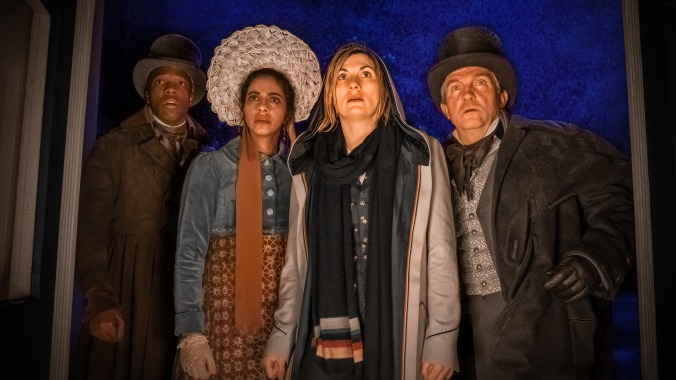Doctor Who meets Frankenstein’s author—and its monster


A little atmosphere goes a long way. “The Haunting Of Villa Diodati” is an episode you could pick apart on a number of different levels, but it’s so engagingly spooky that it’s easy to put aside those concerns while you’re watching it. This is a top-tier take on a Doctor Who haunted house mystery, one that blends early 19th century atmospherics with genuinely unsettling sci-fi and some season-long storytelling to boot. I’ll admit, the Cybermen have never been one of my favorite Doctor Who villains, so I was a bit nervous that the end of this season was set to revolve around them. But like “Dalek” way back in season one, “The Haunting Of Villa Diodati” finds a way to refresh an old threat by exploring a lone survivor in isolation.
Picking up on the teaser from last week, the Doctor, Graham, Ryan, and Yaz land in 1816 at Villa Diodati in Lake Geneva, Switzerland. They expect to find Lord Byron (Jacob Collins Levy) challenging Mary soon-to-be Shelley (Lili Miller) to write the ghost story that will become her masterwork, Frankenstein; Or, The Modern Prometheus. Instead, the party is more concerned with dancing than writing, and Mary’s lover Percy Shelley (Lewis Rainer) is nowhere to be found. Meanwhile, the Doctor is getting “bad vibes” from the house, Graham finds himself stuck in a trick hallway, and eerie figures seem to be haunting every corner.
The early investigative portion of this episode is excellent. The flashes of ghostly apparitions are as terrifying here as they were in the similarly spooky “Hide,” and the skeletal hand skittering about is effectively creepy as well. There’s also some enjoyable comedy to balance out the horror, including Graham’s attempts at old-timey language, Lord Byron’s infatuation with “Mrs. Doctor,” and stuffy physician Dr. Polidori (Maxim Baldry), who immediately challenges Ryan to a duel. (“He does this rather a lot,” Mary sighs.) Elsewhere, Mary’s stepsister Claire Clairmont (Nadia Parkes) provides some emotional heft as she tries to figure out how to escape the toxic pull of her love for Lord Byron.
Of course, haunted Doctor Who stories always turn out to be sci-fi based, and first time Doctor Who writer Maxine Alderton deploys some clever ideas in that department—like a puzzle box perception filter that projects a false layout onto Villa Diodati in order to keep its inhabitants trapped. The scene where the fractured group tries to figure out what’s happening by yelling from their respective rooms is a nice way to jazz up a standard exposition dump. Alderton also comes up with a clever red herring in Polidori’s sleepwalking disorder, which seems like it’s going to be tied into the alien mystery only to emerge as a tool that helps the Doctor realize what’s actually going on. Polidori doesn’t avoid the perception filter’s fake walls when he’s asleep, which allows the Doctor to realize they can all walk through them as well.
It turns out the haunted house is a defense mechanism conjured by the “Cyberium,” a silvery A.I. database that contains all the Cybermen’s knowledge and history. The Cyberium was sent back to the past, where it found a host in Percy Shelley and rewrote the laws of reality in order to remain safely tucked away. Admittedly, it’s not an entirely satisfactory answer to the episode’s mysteries (why does the Cyberium reanimate a skeleton hand, for instance?), but “The Haunting Of Villa Diodati” mostly gets away with it by shifting to a new mystery instead: The “lone Cyberman” that Jack warned the companions about back in “Fugitive Of The Judoon.”
Like Rusty from “Into The Dalek,” lone Cyberman “Ashad” offers an intriguing new lens on an enemy we know well. He’s only half-complete and lacks the emotional inhibitor that turns the Cybermen into emotionless machines. He’s an angry Cyberman, which allows Patrick O’Kane to deliver a effectively unsettling performance and a brand new kind of Cyberman physicality. His corpse-like (or Borg-like) look becomes the inspiration for Mary Shelley’s famed monster. In a nice subversion, however, her attempt to reach out to Ashad with the kindness her fictional creature longs for winds up backfiring. Despite his emotions (or perhaps because of them), Ashad is just as ruthless as his full-on Cybermen brethren. He murdered his own children when they tried to join the resistance.
My biggest lingering question about this episode is why the Cyberium is so reluctant to return to Ashad. Does it not want to cooperate with a half-finished Cyberman? Are Percy and the Doctor strong enough “guardians” that they can bend the Cyberium to their will? Or is it just a plot contrivance to be handwaved away? Hopefully next week’s Cyber War-focused episode will clear that up.
Where I’m less forgiving of this episode’s third act flaws is in the handling of its guest cast. I understand the appeal of dropping the Doctor into the exhilarating literary highs of “the year without a summer,” but putting so many major historical players into an adventure that also has to introduce the lone Cyberman is maybe a bit too much for one episode to handle. Weirdest of all is the way this episode positions the creation of Mary Shelley’s Frankenstein as its central historical event, only to end with the Doctor defending the importance of the legacy of… Percy Shelley.
Mr. Shelley is, of course, a majorly influential Romantic poet in his own right, but “The Haunting Of Villa Diodati” doesn’t do a lot to educate viewers on his legacy. And even if it did, I’m still not sure he’d top the list of writers whose premature deaths would irreparably change history. “Words matter,” the Doctor declares when Ryan suggests it’d be okay to let Percy die if it meant saving the entire universe. But this episode doesn’t really make the case for the power of the pen, outside of having Byron occasionally recite some verse. The literary focus feels scattered and generic rather than educational and specific. I get that changing history has a ripple effect, but the line from “Percy Shelley dies six years too early” to “Ryan Sinclair is never born” seems a bit, well, wibbly wobbly.
It’s clearly a cheat code to get us to the dramatic moment where the Doctor declares that the TARDIS fam is only a flat team structure up to a point. When push comes to shove, she’s the leader who has to make the impossible decisions about whether it’s better to jeopardize the past or put the future at risk. This time around she chooses to ignore Jack’s warning, save Percy’s life, and deal with the fallout afterwards. Bringing out the less sunny side of the 13th Doctor’s personality has been a really effective throughline this season, and I’m glad to see that darkness return after last week’s episode seemed to reset her to the kookiness of her debut season. At worst, “The Haunting Of Villa Diodati” is a fun, atmospheric romp. At best, it’s an exhilaratingly lead-in to whatever explosive twists the two-part finale has in store.
Stray observations
- In real life, Claire Clairmont wasn’t able to end her toxic connection to Lord Byron because she was pregnant with his child—a story that ultimately had a very tragic ending. I’m not sure if her moment of empowerment in this episode is supposed to read as tragic dramatic irony or a suggestion that the TARDIS fam really did change history just a little.
- It’s a nice bit of continuity to bring up the Doctor’s friendship with Ada Lovelace when she meets Ada’s father, Lord Byron.
- There’s an interesting beat where Yaz compares her relationship with the enigmatic Doctor to Claire’s relationship with Lord Byron.
- It’s not entirely consistent, but I appreciate that there was at least some effort to make the Doctor’s hair look frizzy and messy after she comes in from the rain.
- I love how casually this episode reveals that Graham was probably seeing real ghosts amidst the Cyberium madness.
- Bill Potts isn’t mentioned by name, but you can feel her presence in how adamantly the Doctor insists that her companions stay far, far away from the Cyberman.